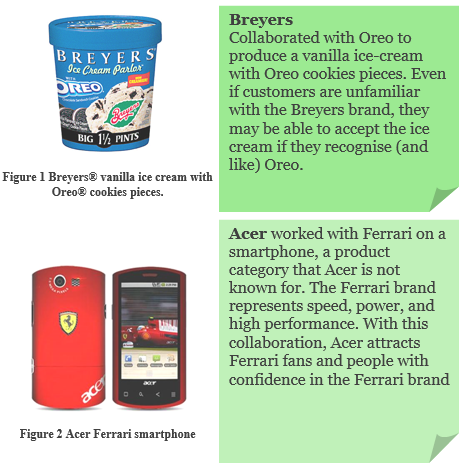Co-Branding
Co-branding refers to two or more companies agreeing to place their brands on a single product or service. The joint products or services are usually marketed together.
Co-branding increases the strength of the brands, making customers more willing to accept the product and even pay a premium for it. Leveraging on a more established brand or one that is well accepted by consumers helps your product gain acceptance with them. In the process, you may lower the cost of introducing your product or even borrow expertise from other companies and expand into other product categories.
Co-branding refers to two or more companies agreeing to place their brands on a single product or service. The joint products or services are usually marketed together.
Co-branding increases the strength of the brands, making customers more willing to accept the product and even pay a premium for it. Leveraging on a more established brand or one that is well accepted by consumers helps your product gain acceptance with them. In the process, you may lower the cost of introducing your product or even borrow expertise from other companies and expand into other product categories.
Tip
Ingredient Branding
A popular way of leveraging on a more established brand is ingredient branding. This is when well-known materials, components or parts are used with or integrated into your product. This collaboration is highlighted, usually by listing the established brand with your own brand.
For example, it is common for computer makers such as Hewlett Packard, Acer and Dell to highlight in their advertisements and label on their computer units the use of Intel processors. Even fairly unfamiliar brand such as Axioo, are able to sell notebooks by using Intel processors, which have become widely recognised and accepted by consumers.
Secondary Association
Secondary association refers to the enhancement of your brand by associating it with other entities that are positively perceived by your customers.
It can enhance the credibility of your brand and invoke positive feelings.
Tip
If your business is one that resells products or carry someone else’s brand, whether through licensing, franchising or providing of store space, you need to think of the following:
Make sure you think about ownership of intellectual property rights. How do you ensure that you are investing time and resources into something you will own eventually?
Think about Performance Motors and Robinsons built their brand around reselling other products. How can you build my own brand name as a preferred distributor?
Celebrity Endorsement
Celebrity endorsement leverages on a celebrity’s popularity to enhance your brand.
This is a costly strategy and selecting the right celebrity and determining the benefits of the endorsement is not an easy task.
A celebrity’s personal image and values may be strongly associated and transferred to your brand through endorsement.
It is important for you to evaluate if these image and values are consistent with your brand image. You also need to be prepared for situations where the results of the endorsement do not turn out the way you hoped.
With celebrity endorsements, you can draw attention to your brand, shape consumers’ perception of your brand and add personality to your brand. There have been immensely successful cases of celebrity endorsement.
On the flip side, some celebrities may dilute your campaign by endorsing other products that are very different from yours or even contradicts and draws focus away from your brand or product.
Consumers are also savvy enough to perceive it when the celebrities do not use or believe in the brand they endorse. Last but not least, remember that celebrities are not perfect. They can be embroiled in scandals or lose popularity.
Case Study
No Relationship’s Perfect
In 2000, Jamie Oliver’s career as a chef was taking off with a successful television programme, The Naked Chef, and bestselling cookbooks under his belt. In the same year, Sainsbury’s, Britain’s third largest supermarket chain, signed him on with a £2 million a year endorsement deal. It proved to be a worthy investment with Oliver helping to generate an estimated increase of £1.12 billion in sales in the first two years of his endorsement.
However, things turned not so pretty in 2008 when Jamie Oliver criticized Sainsbury’s on his show for not participating in a public debate on chicken farming. Although Oliver later apologized publicly to Sainsbury's for his outburst, the company was deeply upset by this perceived act of disloyalty from someone they were paying millions to boost their image.
Corporate Social Responsibility
Corporate social responsibility [CSR] is an organisation’s commitment to act responsibly in carrying out activities that affect the environment, consumers, stakeholders, employees and communities.
Companies should build the CSR mechanism within the organisation with the aim to give back to society rather than seeing it as a branding tool. However, studies have shown that companies that engage in CSR have experienced increased brand value, enhanced image and even improved financial performance in the long run.
CSR needs to be something that the company is passionate about, and integrated into the very way the business is run.
Several well-known companies, such as Ben & Jerry’s and The Body Shop, have championed CSR. They are recognised and rewarded for their strong corporate ethics and social responsibility.
Case Study
Caring Capitalism
Ben & Jerry’s reputation for being socially responsible was well established over the years on philanthropy, fair treatment of employees and environmental practices. You should not just claim to be socially responsible – you need to walk the talk.
Ben & Jerry’s procures fair trade ingredients whenever possible, such as free-range eggs and sustainably produced dairy products. This helps to ensure that more people are working in safe conditions, working reasonably hours and receiving fair wages. Ben & Jerry’s participates actively in community-based development projects to look into sustainability. They also donate a portion of its pre-tax profits to corporate philanthropy.

